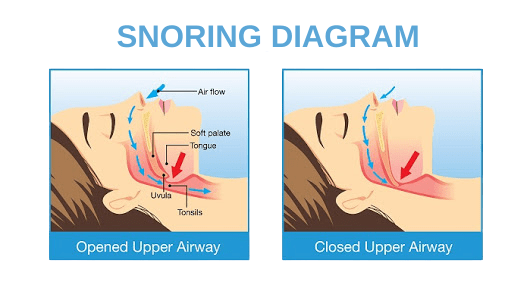How to Avoid Sleeping With Open Mouth
It is tough to sleep at night if you constantly wake up with a sore open mouth. This open mouth is because the soft palate will often get in the way while sleeping and block the airway. However, there are ways around this, and you will avoid having such an uncomfortable sleep.
You should try to avoid sleeping with your mouth open, but sometimes that’s just unavoidable. If your throat is expanded, then you absolutely must breathe through your nose.
Sinus/allergies: If you have a history of allergies and sinus problems, this would be the likely scenario for the open mouth. If it is possible, try to have your sinuses flushed out before going to bed.
If this is not possible, you can use a nasal spray or clearing your nose before sleeping. This is especially important for people with allergies. When you sleep, the muscles in your face relax, which reduces the ability to breathe normally.
More: What I Wish I Knew A Year Ago About Best Travel Apps For Backpackers
What to Do When You Cannot Breathe Regularly?
If you find that you cannot breathe regularly during the night, the most likely reason is that the muscles in your face relax when you are sleeping. They are incredibly tight in the morning. If you snore when you sleep, you can use some methods like keeping your mouth closed, pursing your lips, etc. The difference here is that you’re trying to open your airway through these relaxing ways.
What to Do When You Have an Open Mouth Breathing Habit?
Doing this will help to open your airway while you sleep. Again, like when you’re trying to breathe through your nose, you want to hold your breath and blow out all of the mucus. Make sure that your mouth is closed when you sleep to minimize any snoring issues that you may have.
Either way, keeping your mouth & jaw closed while you sleep are the most important things that you need to focus on to quit your open-mouth breathing habit. Hopefully, these short points have given you some helpful tips for breaking this habit. Just a few more simple changes to your practices, and you’ll find that you’ve finally conquered the problem and stopped snoring.
More: Kedarnath Trek – A Short Description of What, How & When
Sleeping with open mouth symptoms

open mouth sleeping symptoms
A common sleep disorder that many adults suffer from is snoring. The open mouth method is used by most people as a way of breathing when sleeping. Unfortunately, snoring can also cause many health problems, such as sleep apnea, as the American sleep apnea association explains this deep. People that snore often have some sleep disorder, and if you don’t treat it, you could end up hurting yourself or someone else.
One common disorder that snorers suffer from is dry mouth. When sleeping, this is an issue because gravity pulls on the lower jaw, causing the tongue to fall back into the throat. An easy way to fix this problem is to wear a deviated septum ring, which forces the language to fall back into the throat. The septum should be made suitable to aid proper breathing, so wearing the ring can solve many breathing-related issues.
When your mouth is open, your airway is smaller than when your mouth is closed so that air can travel faster. This means that more air can hit the back of your throat, causing vibrations and snoring. If you tend to close your mouth while sleeping, try using nasal strips that open up your nasal passages and prevent your throat from excessive and unnecessary air inhalation.
Some think that they have a breathing problem, but they may have a snoring problem. For some people, snoring and breathing are not related, but they do tend to happen simultaneously for others. When someone snores, they tend to breathe through their nose, forcing their mouth shut. It is possible to stop snoring, but people who tend to sleep with their mouth open are more likely to do so. When they have an open mouth breathing habit, they are likely to breathe through their mouth, making it even easier to snore.
When someone sleeps with their mouth open, it makes it more likely that the tongue will go back into the throat, causing more vibrations and louder snoring sounds. To prevent this, your teeth must come out while sleeping. The more teeth that come out, the less likely you will snore as your airways will get more space between them.
Is Sleeping with Open Mouth A Wrong Signal For Your Teeth?
While there is nothing wrong with having an open mouth while sleeping, but you must visit a dentist if this becomes a habit. Dentists are experienced in helping patients stop bad breath, tooth decay, gum disease, and similar oral health problems. Your dentist can also help you correct gum problems that lead to cavities and remove plaque already on your teeth and tongue. However, maybe he cannot cure you if you continue to have this habit. This is why you should make a dentist appointment if you think that you snore too loudly or if your teeth are misaligned.
Disadvantages of Breathing Through Your Nose
While most people think it’s a disadvantage of breathing through the nose while sleeping, there are some major benefits of breathing through your nose that you should be aware of.
First of all, when your lungs are full of oxygen, it is much easier to breathe normally and avoid sleep apnea.
Second, breathing through your nose is beneficial to your overall health and will prevent many diseases and conditions from occurring.
The major benefit of breathing through your nose versus breathing through your mouth is the ability to control your airflow. One of the biggest factors that can lead to sleep apnea is when your airways are blocked. When your airways are blocked, your body has no way to make the airflow into your lungs. This results in a shortage of breath while you are asleep, which leads to daytime sleepiness and drowsiness.
While many people think that closed-mouth breathing is the easiest way to breathe, research has shown that those who breathe through their mouth have less chances of having a snoring problem, have more stable breathing, and have a higher tolerance to cold air.
Some common disorders directly connected to the lack of airflow include sleep apnea, sore throats, dry coughs, postnasal drip, sinusitis, and headaches. While some people think that they do not have any problems breathing through the nose, but this is not true. Well, there are plenty of other reasons that you should switch to breathing by keeping your mouth closed during sleep. If you want to go deep into this, then consult a doctor today!







